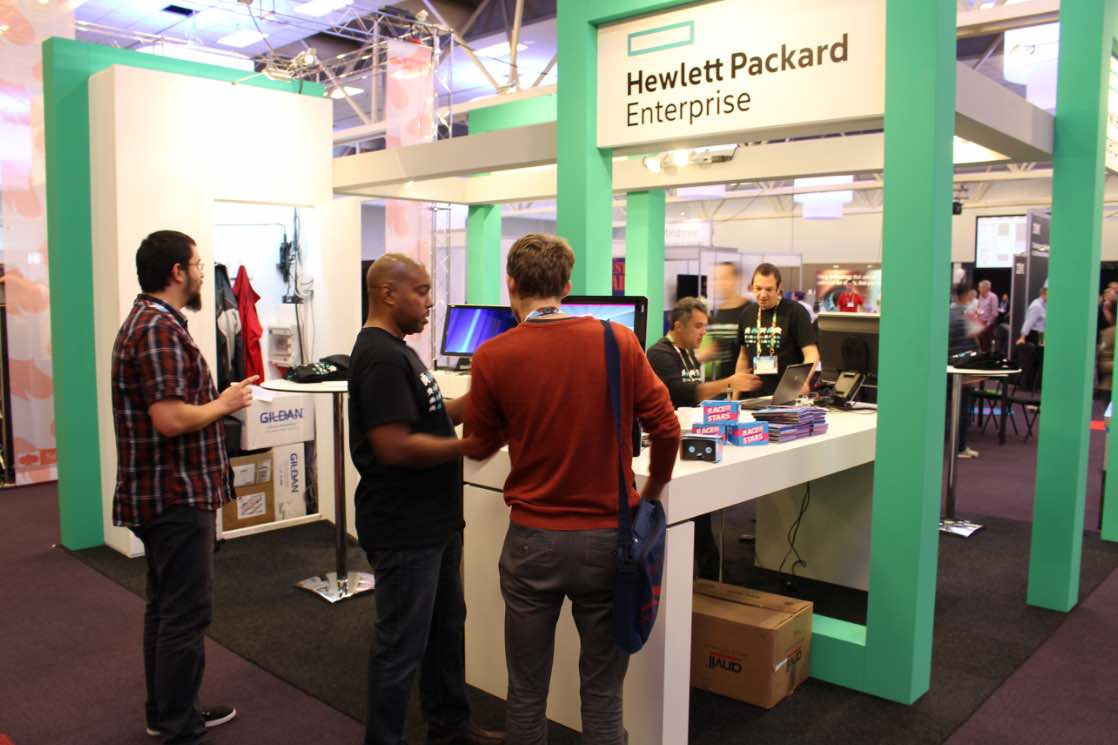 Today at SC17, Hewlett Packard Enterprise announced new high-density compute and storage solutions that enable enterprises to harness the power of high performance computing and artificial intelligence applications. The new and enhanced solutions are part of the industry-leading HPE Apollo compute platform, designed to simplify HPC and AI adoption for enterprises of all size.
Today at SC17, Hewlett Packard Enterprise announced new high-density compute and storage solutions that enable enterprises to harness the power of high performance computing and artificial intelligence applications. The new and enhanced solutions are part of the industry-leading HPE Apollo compute platform, designed to simplify HPC and AI adoption for enterprises of all size.HPC and AI applications are not exclusive to big research organizations and corporations; they can drive efficiency and innovation in the day-to-day business of every company,” said Bill Mannel, Vice President and General Manager, HPC and AI Segment Solutions, Hewlett Packard Enterprise. “Today, HPE is augmenting its proven supercomputing and large commercial HPC and AI capabilities with new high-density compute and storage solutions to accelerate market adoption by enabling organizations of all sizes to address challenges in HPC, big data, object storage and AI with more choice and flexibility.”
- HPE Apollo 2000 Gen10 System: This next-generation dense, multi-server platform with a “plug and play” system configuration is ideal for customers with limited data center space who are looking to support enterprise HPC and deep learning applications. This platform expands easily with a scale-out architecture while leveraging the efficiencies of a shared infrastructure. HPE Apollo 2000 Gen10 supports NVIDIA® Tesla® V100 GPU accelerators to enable deep learning training and inference across a wide variety of usages such as real-time video analytics for public safety. The system uses Intelligent System Tuning to accelerate application performance. As part of the world’s most secure industry standard server family [2], it includes proprietary HPE firmware security features.
- HPE Apollo 70: This dense, scalable platform – and HPE’s first ARM-based HPC system – brings more choice and flexibility to HPC customers. It provides easy access to HPC technology with support for standard HPE provisioning, cluster management and performance software. The Apollo 70, using Cavium’s 64-bit ARMv8-A ThunderX2™ Server Processor, is purpose-built for memory intensive HPC workloads and delivers up to 33 percent more memory bandwidth than today’s industry standard servers. The Apollo 70 also provides access to HPE’s partnership ecosystem delivering key HPC components including Red Hat® Enterprise Linux®, SUSE® Linux Enterprise Server for ARM, and Mellanox® high-speed InfiniBand & Ethernet fabric solutions.
- HPE Apollo 4510 Gen10 System: This next generation system is purpose-built for object storage and delivers one of the highest storage capacities in any standard depth 4U server, with up to 600TB per system. The platform is ideal for customers looking to optimize the retention and placement of massive amounts of data, using object storage as an active archive with immediate access to structured and unstructured data. The HPE Apollo 4510 Gen10 delivers greater performance with 16 percent more cores than the previous generation. New support for NVMe cards can be used as an efficient Scality RING metadata cache enabling 100 percent of bulk drive bays for object data storage. In addition, the HPE Apollo 4510 Gen10 features a new front-loading, dual-drawer design with standard rack depth to help customers easily maintain their systems.
- HPE LTO-8 Tape: Tape is seeing a resurgence in its use as an added layer of protection against cybercrime and ransomware attacks to lower data center risk with reliable offline and off-premises data protection. HPE’s new long-term retention solution allows customers to offload primary storage to tape while reducing the cost of storing data overtime. With up to 30 terabytes storage capacity per tape cartridge, the new HPE LTO-8 data cartridge provides double the capacity in the same data center footprint as the previous LTO-7 generation – making it a perfect fit for HPC data centers. The HPE T950 tape library now securely stores up to 300.6 petabytes [3] of data, while the HPE TFinity ExaScale tape library provides storage capacity for up to 1.6 exabytes of data. In addition, LTO-8 full height drives offer up to 360MB/s transfer rate speeds, a 20 percent performance increase from the LTO-7 generation.
Enterprises are looking for ways to leverage HPC and AI in their business processes to gain faster insights and intelligence for competitive advantage,” said Steve Conway, Senior Vice President of Research, Hyperion Research. “HPE’s next-generation and new Apollo systems will facilitate that adoption by providing easier integration and management while delivering extreme density to reduce data center footprint and extend the range of HPC and AI use cases.”
Visit the HPE booth #925 at SC17.




